Personality Traits, Political Affiliation, and Education: Implications for Talent Management
Today’s political landscape is divisive, and political views aren’t always left outside the office. Building a workplace that makes space for employees with a variety of political views is key to inclusivity and diversity. But achieving political diversity in the workplace is not straightforward.
In previous research, we revealed that there are personality traits highly correlated with liberal and conservative political views. Given a contentious election year, we wanted to dig in further. Understanding the intersection of education and political affiliation provides valuable insights for talent management.
Here we explore these trends and their implications for the workforce. We examine how understanding these correlations can help organizations better align individuals with roles where they can maximize their impact, thereby fostering a more dynamic, innovative, and diverse workplace. By recognizing and leveraging the strengths associated with different political and educational backgrounds, HR leaders can create more balanced and effective teams. This approach not only enhances decision-making and problem-solving but also contributes to a more inclusive organizational culture.
Our Methodology
To evaluate how education and political affiliation intersect with personality, we conducted a study of 1,030 individuals. Participants’ political orientations were categorized into four groups: “Very Conservative,” “Slightly Conservative,” “Slightly Liberal,” and “Very Liberal.” The distribution of participants across political orientations is as follows: 102 were Very Conservative, 232 were Slightly Conservative, 404 were Slightly Liberal, and 292 were Very Liberal.
Participants were also asked to self-report their highest level of education, categorized into the following levels: Associates Degree, Bachelors Degree, Doctorate (M.D. or Ph.D.), High School degree, Masters Degree, and Professional Degree (MBA, JD, etc.). The educational distribution of participants was as follows: 202 with an Associates Degree, 393 with a Bachelors Degree, 8 with a Doctorate (M.D. or Ph.D.), 284 with a High School degree, 114 with a Masters Degree, 29 with a Professional Degree (MBA, JD, etc.).
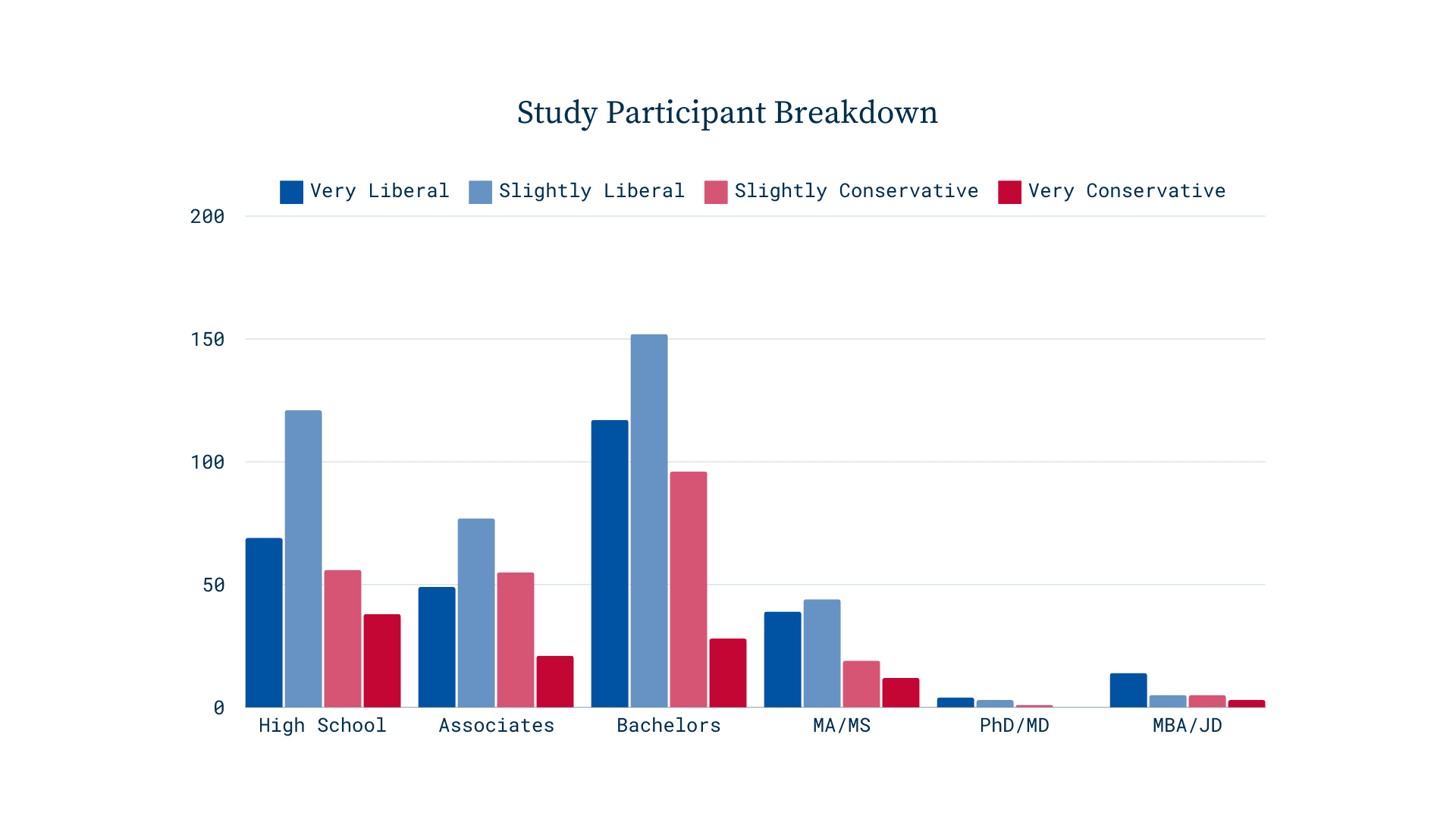
All of our participants were required to complete Cangrade’s 14-minute personality test. Cangrade’s assessment is designed to measure 50 different personality traits using a combination of calibrated self-report items to assess a broad range of psychological dimensions.
To assess any potential correlations between education level and political affiliation, the education data was tabulated against political orientation. After evaluating this information, we analyzed the group’s personality test results to compare the distribution of the 50 measured traits across different political and educational groups. This analysis allowed us to explore potential patterns, such as whether certain traits were more prevalent in individuals with higher education levels who identified with specific political affiliations.
Our findings on how personality, political affiliation, and education intersect, and their impact on talent management are below.
A Broad View of Political Affiliation and Education
In reviewing how education correlates with political affiliation at a high level, it quickly became clear that the higher the level of education a person attained the more liberal their viewpoints.
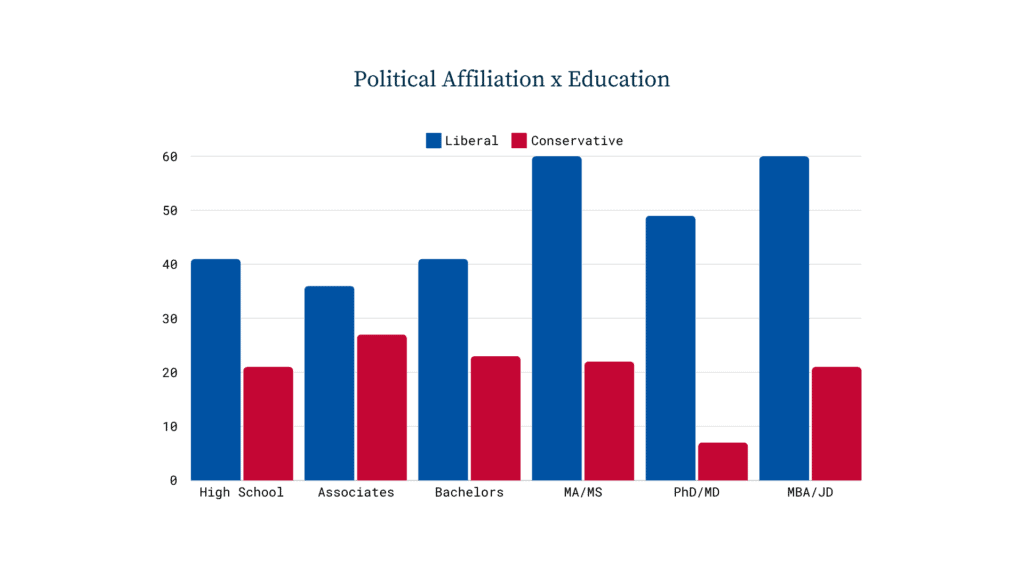
Those with a high school education, Associate or Bachelor’s degree have a similar split between liberal and conservative viewpoints, hovering around 40% and 20%, respectively. Of those with only a high school education, 41% identified as Liberal or Very Liberal, whereas 21% identified as Conservative or Very Conservative. Among those with an Associate Degree (AA/AS), 36% were Liberal or Very Liberal, and 27% were Conservative or Very Conservative. Similarly, 41% of Bachelor of Science (BA/BS) degree holders were Liberal or Very Liberal, while 23% were Conservative or Very Conservative.
This trend becomes more pronounced at higher education levels. Among individuals with a Master of Science (MA/MS) degree, 60% were Liberal or Very Liberal, compared to 22% who were Conservative or Very Conservative. Of those with a PhD or MD, 49% were Liberal or Very Liberal, while only 7% were Conservative or Very Conservative.
People with professional degrees (MBA/JD) also aligned with this trend: 60% were Liberal or Very Liberal, while 21% were Conservative or Very Conservative.
A Review of Personality Traits and Political Affiliation by Education
Abstract Thinking
Abstract thinking refers to the ability to understand and process complex concepts that are not directly tied to concrete experiences. People high in abstract thinking are skilled in recognizing patterns and making connections between seemingly unrelated ideas.
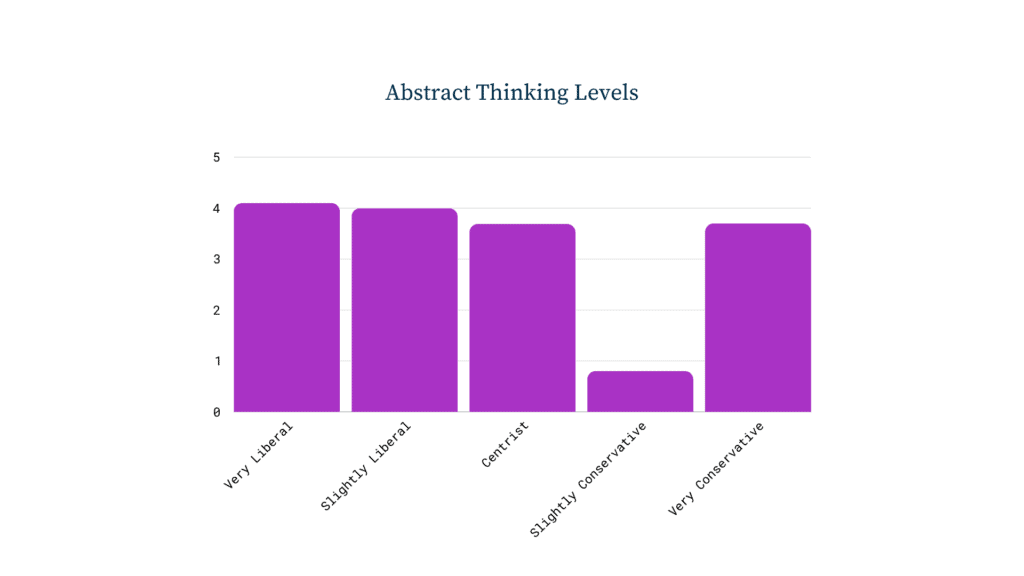
When comparing political groups, Very Liberal people had the highest average levels of Abstract Thinking (4.1), compared to Very Conservative people (3.7), Slightly Conservative people (.8), Centrists (3.9), and Slightly Liberal people (4.0).
When looking at degree holders, it was evident that people with PhDs/MDs had the highest average scores in abstract thinking (4.3) compared with other groups. Within this, Very Liberal PhD and MD holders were by far the highest in Abstract Thinking, averaging 4.7.
The relationship between liberal ideologies and higher levels of abstract thinking may imply that liberal-leaning people are generally more open to complexity, nuance, and ambiguity.
The finding that PhD and MD holders exhibit the highest levels of Abstract Thinking, particularly among very liberal individuals, highlights an important contribution to the workforce. Individuals with higher levels of Abstract Thinking are often better suited for roles that require innovation and strategic thinking. Understanding this can help align people with roles where they can maximize their impact.
Mastery Orientation
Mastery Orientation is a mindset that focuses on learning, improving, and mastering new skills or knowledge. Those high in mastery orientation are driven by the desire to achieve personal or professional growth.
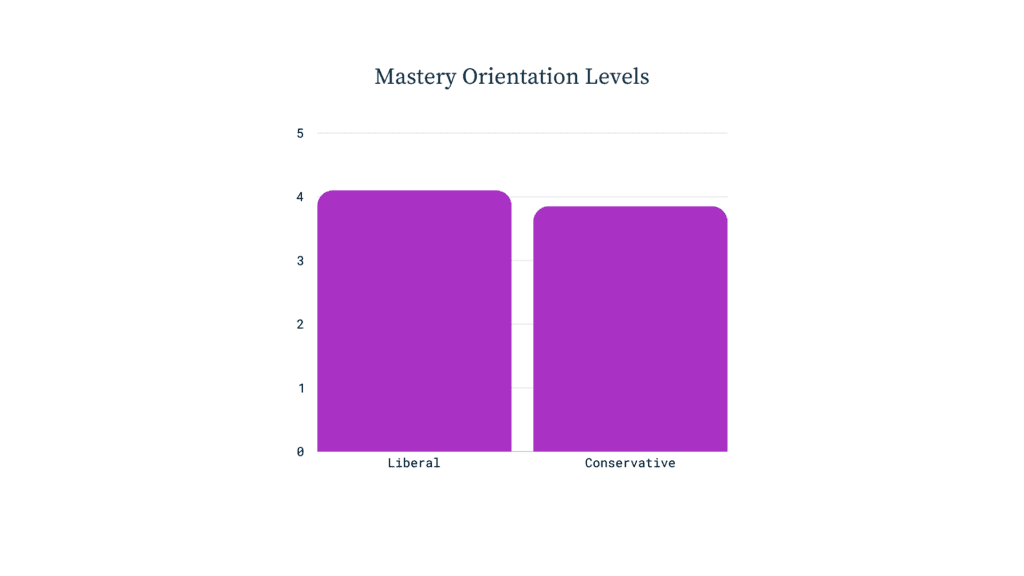
A comparison between political ideologies reveals that Liberals tend to have a higher Mastery Orientation than Conservatives. Liberals averaged a score of 4.1 compared to 3.85 for Conservatives.
Individuals holding Doctorates and professional degrees (MBA, JD, etc.) typically exhibit the highest levels of Mastery Orientation, with average scores of 4.0 and 4.1, respectively. This suggests a significant propensity among these groups to pursue learning, self-improvement, and a deep understanding of their fields.
The relationship between Mastery Orientation and Doctorates and professional degrees suggests that this population is more inclined toward continuous learning and skill enhancement. Organizations can leverage this by positioning such individuals in roles that require ongoing education, adaptation, and challenges.
Individualism
Individualism is a social and psychological construct emphasizing the importance of personal autonomy, self-reliance, and individual achievement. Those high in Individualism value independence, personal responsibility, and their own goals and values over those of a group.
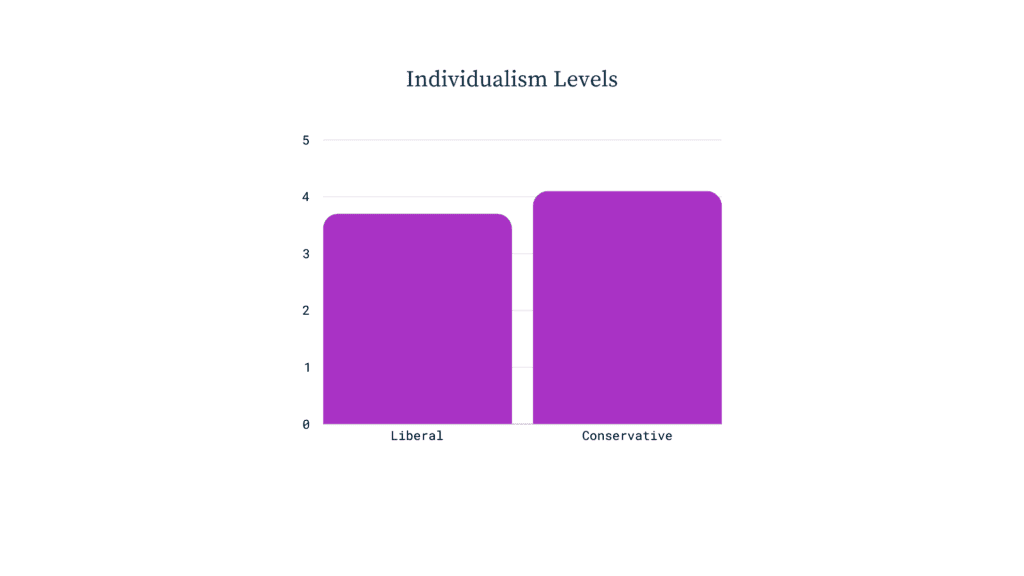
The data suggests a notable trend: Very Conservative individuals exhibit the highest levels of Individualism, with an average score of 4.1. This trend is particularly pronounced among those with Associate degrees, who averaged a 4.2, and those with high school diplomas, at an average of 4.0.
On the other hand, Very Liberal people and Slightly Liberal people were the lowest in Individualism, at 3.6 and 3.8, respectively.
Individuals with higher Individualism might thrive in roles emphasizing autonomy and personal accountability. Positions that reward individual initiative and performance, such as sales or entrepreneurial roles within larger companies, could be particularly appealing to this group.
On a team, people with lower levels of Individualism can help facilitate collaboration and collective problem-solving, while those with higher levels can contribute unique perspectives.
Self-Confidence
A well-known personality trait, Self-Confidence is the belief in your abilities, qualities, and judgment. Individuals high in Self-Confidence feel capable and secure in their actions, often leading to a positive outlook and resilience in the face of obstacles.
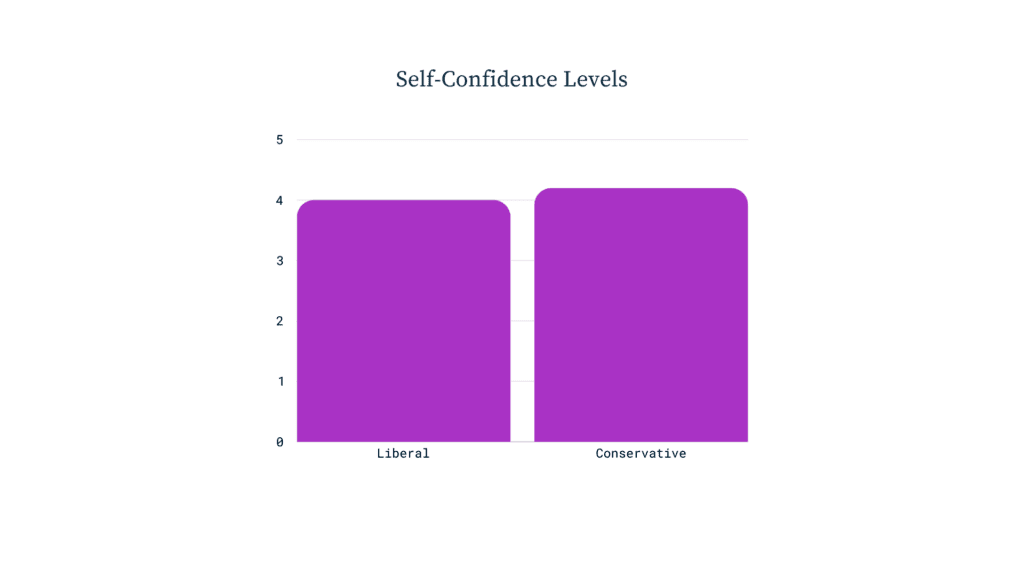
Generally, Conservatives scored higher in Self-Confidence, averaging 4.2, compared to Liberals, who averaged 4.0. However, a notable exception exists among highly educated individuals. Very Liberal PhDs and MDs, as well as Very Conservative professional degree holders both exhibited the highest levels of Self-Confidence, each averaging 4.4.
While Conservatives typically show higher Self-Confidence, the trend shifts notably at higher educational levels. The increased Self-Confidence among Very Liberal PhDs and MDs could be attributed to the rigorous demands and achievements of their academic and professional training, which might boost self-assurance.
Knowing that Very Liberal and Very Conservative professionals with advanced degrees have high Self-Confidence, they can be strategically placed in teams where strong leadership is needed.
Takeaways and Action Steps
In conclusion, the intersection of education, political affiliation, and personal traits offers valuable insights for building more effective and inclusive teams in the workplace. In the workplace, leaders who can combine forward-thinking leadership with a strong sense of pragmatism are more likely to build dynamic and inclusive teams. By recognizing and valuing the differences in individual traits, these leaders can better align team members with roles where they can have the greatest impact. This approach not only enhances the overall effectiveness of the team but also fosters a more innovative and diverse workforce.
In an effort to create a politically diverse and balanced organization workplaces can take these steps:
- Emphasize the value of diverse educational experiences in job postings to attract applicants from broader education levels to apply.
- Include DE&I statements to encourage all backgrounds to apply.
- Create an equitable hiring process that removes bias, particularly affinity bias. Implement bias-free hiring solutions like Cangrade’s to hiring decisions are based on merit and potential, rather than unconscious preferences.
By prioritizing these strategies, organizations can cultivate an environment where diverse perspectives are not only welcomed but celebrated, leading to stronger, more resilient teams.